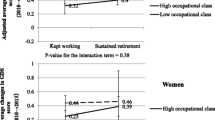Abstract
This study investigates the relationship between depression and labor force participation by examining whether retirement induces depression or depression discourages labor force participation. The sample is drawn from newly available, nationally representative data of those 50–64 years old using the 2006 Korean Longitudinal Study of Aging. We model two possibly inter-related outcomes; depression and work. We first examine whether retirement influences depression, using the mandatory retirement provisions of the Korean labor force to identify a pathway to retirement that is not a consequence of depression. We then estimate the determinants of current work using instrumental variables for depression. We find that mandatory retirement is not associated with subsequent depression but find evidence that depression leads to reduced labor force participation, after using instrumental variables to predict the existence of depressive symptoms among respondents. We find strong evidence that depression leads to reduced labor force participation. Although retirees are often more depressed than workers, the causes that induce retirement, such as poor health, care-giving responsibilities, and inability to find a job, are also associated with depression.
Similar content being viewed by others
References
Andreasen, E. M., Malmgren, J. A., Carter, W. B., & Patrick, D. L. (1994). Screening for depression in well older adults: evaluation of a short form of the CES-D. American Journal of Preventive Medicine, 10(2), 77–84.
Chatterji, P., Alegria, M., & Takeuchi, D. (2008). Psychiatric disorders and employment: New evidence from the collaborative psychiatric epidemiology surveys, NBER Working Paper Series, Working Paper 14404, National Bureau of Economic Research: Cambridge, MA.
Choi, K. (2005). “Work and retirement of older Korean workers.” The first international advisory meeting for Korean longitudinal study of aging. Seoul: Korea Labor Institute.
Conti, R. M., Berndt, E. R., & Frank, R. G. (2006). Early retirement and public disability insurance applications: Exploring the impact of depression, NBER Working Paper Series, Working Paper 12237, National Bureau of Economic Research: Cambridge, MA.
Currie, J. (2008). Healthy, wealthy, and wise: Socioeconomic status, poor health in childhood, and human capital development, NBER Working Paper Series. Working Paper 13987, National Bureau of Economic Research: Cambridge, MA.
Daves, D., Rashad, I., & Spasojevic, J. (2006). The effects of retirement on physical and mental health outcomes, NBER Working Paper Series, Working Paper 12123, National Bureau of Economic Research: Cambridge, MA.
Deuchler, M. (1992). The Confucian transformation of Korea: A study of society and ideology. Harvard Yenching Institute Monograph Series 36, Council on East Asia Studies. Cambridge: Harvard University.
Freeman, R. B., Kim, S., & Keum, J. (2008). Beyond flexibility: Roadmaps for Korean labor policy. Seoul: Korea Labor Institute.
Hamilton, V. H., Merrigan, P., & Dufresne, E. (1997). Down and out: estimating the relationship between mental health and unemployment. Health Economics, 6(4), 397–406.
Jung, E., & Cheon, B-y. (2006). Economic crisis and changes in employment relations in Japan and Korea. Asian Survey, 46, 457–476.
Kasl, S. V., & Jones, B. A. (2000). The impact of job loss and retirement on health. In L. F. Berkman & I. Kawachi (Eds.), Social epidemiology (pp. 137–173). Oxford: Oxford University Press.
Kessler, R., Greenberg, P., Mickelson, K., Meneades, L., & Wang, P. (2001). The effects of chronic medical conditions on work loss and work cutback. Journal of Occupational and Environmental Medicine, 43(3), 218–225.
Korea National Statistical Office. (2009). Korea statistical information service. Retrieved on March 13, 2009, from http://www.kosis.kr/.
Kwon, H-j. (2002). Welfare reform and future challenges in the Republic of Korea: beyond the developmental welfare state? International Social Security Review, 55(4), 23–38.
Lee, C. (2006). Older labor in Korea: Long-term changes in economic activity and employment structure. Seoul: Seoul National University Press.
Lee, E. E., & Farran, C. J. (2004). Depression among Korean, Korean American, and Caucasian American family caregivers. Journal of Transcultural Nursing, 15(1), 18–25.
Maddala, G. (1983). Limited-dependent and qualitative variables in econometrics. Cambridge: Cambridge University Press.
Mein, G., Martikainen, P., Hemingway, H., Stansfeld, S., & Marmot, M. (2003). Is retirement good or bad for mental and physical health functioning? Whitehall II longitudinal study of civil servants. Journal of Epidemiology and Community Health, 57, 46–49.
NPS, National Pension Service. (2006). 2005 National Pension Statistical Yearbook (Vol. 18). Korea: Seoul.
Park, F., Park, Y-b, Betcherman, G., & Dar, A. (2001). Labor market reforms in Korea: Policy options for the future. Washington DC: The World Bank.
Radloff, L. S. (1977). The CES-D scale: a self-report depression scale for research in the general population. Applied Psychological Measurement, 1(3), 385–401.
Smith, J. P. (1999). Healthy bodies and thick wallets: the dual relation between health and economic status. Journal of Economic Perspectives, 13(2), 145–166.
Szinovacz, M. E., & Davey, A. (2004). Retirement transitions and spouse disability: effects on depressive symptoms. The Journals of Gerontology. Series B, Psychological Sciences and Social Sciences, 59(6), S333–S342.
Zimmerman, F. J., & Katon, W. (2005). Socioeconomic status, depression disparities, and financial strain: what lies behind the income-depression relationship? Health Economics, 14(12), 1197–1215.
Author information
Authors and Affiliations
Corresponding author
Appendix A
Appendix A
Rights and permissions
About this article
Cite this article
Lee, J., Smith, J.P. Work, Retirement, and Depression. Population Ageing 2, 57–71 (2009). https://doi.org/10.1007/s12062-010-9018-0
Received:
Accepted:
Published:
Issue Date:
DOI: https://doi.org/10.1007/s12062-010-9018-0




